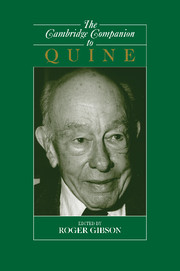Book contents
- Frontmatter
- Willard Van Orman Quine
- 1 Aspects of Quine’s Naturalized Epistemology
- 2 Quine on the Intelligibility and Relevance of Analyticity
- 3 Quine’s Meaning Holisms
- 4 Underdetermination of Physical Theory
- 5 Quine on Reference and Ontology
- 6 Indeterminacy of Translation
- 7 Quine’s Behaviorism cum Empiricism
- 8 Quine on Modality
- 9 Quine and Logical Positivism
- 10 Quine and Logic
- 11 Quine on Quine
- Selected Bibliography
- Index
3 - Quine’s Meaning Holisms
Published online by Cambridge University Press: 28 May 2006
- Frontmatter
- Willard Van Orman Quine
- 1 Aspects of Quine’s Naturalized Epistemology
- 2 Quine on the Intelligibility and Relevance of Analyticity
- 3 Quine’s Meaning Holisms
- 4 Underdetermination of Physical Theory
- 5 Quine on Reference and Ontology
- 6 Indeterminacy of Translation
- 7 Quine’s Behaviorism cum Empiricism
- 8 Quine on Modality
- 9 Quine and Logical Positivism
- 10 Quine and Logic
- 11 Quine on Quine
- Selected Bibliography
- Index
Summary
Quine’s [historic[ importance does … depend upon his being right in one central claim, a claim which he expressed by saying that there is no sensible distinction between analytic and synthetic truths but which he should have expressed by saying that there is no sensible distinction between a priori and a posteriori truths.
Putnam 1983Erasing the line between the analytic and the synthetic saved philosophy of language as a serious subject by showing how it could be pursued without what there cannot be: determinate meanings.
Davidson 1986Quine’s writings are the point of departure for the familiar doctrine that goes by the name 'meaning holism'. This doctrine contrasts with meaning atomism, according to which a linguistic expression e in a language L has its meaning 'Auf Eigene Faust' (viz., in and by itself) by virtue of a symbol-world relation independent of, and (metaphysically) prior to, whatever role e has in L. For meaning atomism, reference (however specified), then, is primitive, and the role of e in L is determined by, and derivative from, the meaning e acquires in virtue of that relation. In opposition, according to meaning holism, a linguistic expression e in a language L has its meaning in virtue of its (however specified) relations with other expressions in L; that is, in virtue of its role in L. For meaning holism, since the role of e in L constitutes e’s meaning, reference becomes derivative from, and (metaphysically) posterior to, the role e plays in L.
- Type
- Chapter
- Information
- The Cambridge Companion to Quine , pp. 65 - 90Publisher: Cambridge University PressPrint publication year: 2004
- 4
- Cited by



